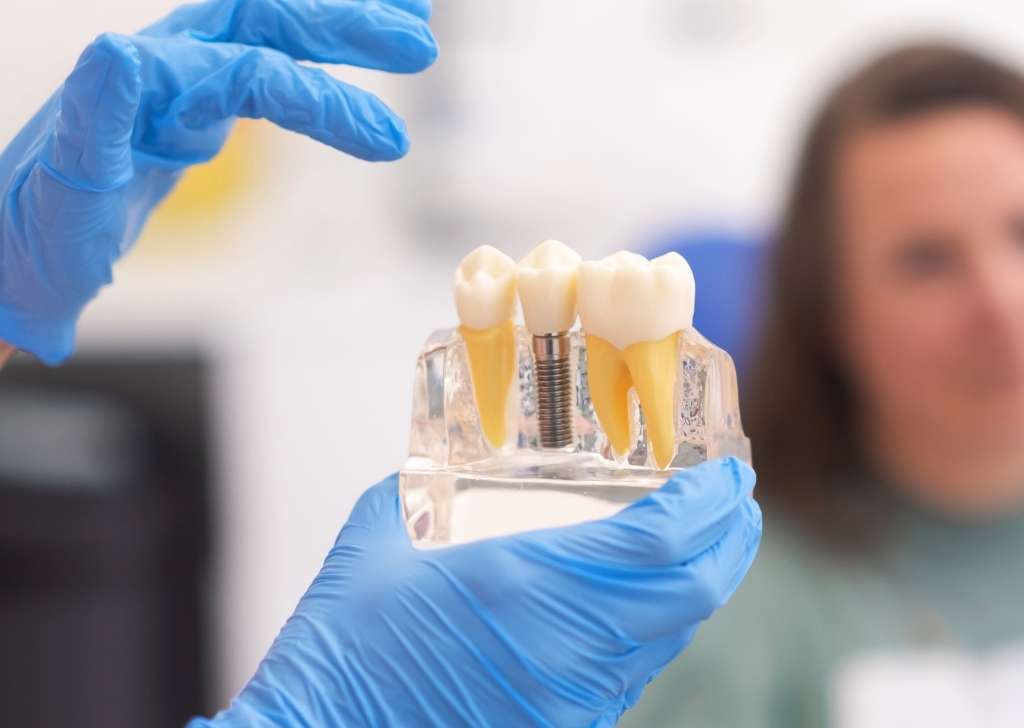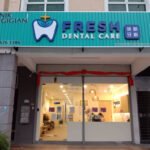Yes, seniors can absolutely get dental implants — and in many cases, it’s the best decision they’ll ever make for their oral health. At Fresh Dental Care Kepong, we’ve successfully helped many older adults restore their smile, chewing ability, and confidence using safe, long-lasting implant solutions. If you’re searching for dental implants in Kepong, this guide is for you.
Are Dental Implants Safe for Seniors?
Age Is Not the Barrier – Health Is
One of the most common myths we hear in our clinic is, “Aren’t I too old for implants?” The truth is, age itself isn’t a disqualifier. What really matters is your overall health, bone condition, and whether your gums are healthy enough to support the implant.
With modern techniques and senior-focused care at our dental clinic in Kepong, the process is often more comfortable than expected.
Why Bone Density and Gum Health Matter
For a dental implant to succeed, it needs to fuse with your jawbone in a process called osseointegration. As we age, bone density naturally declines — especially if teeth have been missing for a long time. This is where a bone graft for dental implant may come in.
If your jawbone isn’t thick enough, our team might recommend a bone graft to rebuild the area before placing the implant. It sounds complex, but it’s a routine part of senior implant procedures and ensures long-term success.
Similarly, if you have gum disease, we’ll need to treat it first. You can explore our laser dentistry services for gum treatment in Kepong to understand how we manage these cases.
Common Concerns – Pain, Recovery, and Failure Rates
Seniors often worry about pain or implant failure. The good news? Modern dental implants have a success rate of over 95%, even among older patients. Most discomfort is minor and can be managed with medication.
Are There Any Other Options For Seniors Aside From Implants?
While dental implants are often considered the gold standard, they aren’t the only option for seniors missing teeth. Depending on your oral health, bone structure, and budget, your dentist might suggest an alternative that better fits your lifestyle.
Removable Dentures
Traditional full or partial dentures are still widely used and more affordable than implants. However, they require daily removal and cleaning, and may shift around while eating or speaking. Many seniors find them inconvenient after a while, especially if they’ve worn down the gums.
Dental Bridges
For seniors missing one or two adjacent teeth, a fixed dental bridge may work. This involves placing crowns on the teeth next to the gap, with a false tooth in between. While effective, it requires grinding down the supporting teeth and doesn’t prevent bone loss in the gap area like implants do.
When Implants Are Still the Better Choice
Alternatives might be suitable for short-term use or when bone health isn’t ideal. But if you want a long-lasting, low-maintenance solution, implants offer the closest thing to a natural tooth — especially when placed by experienced dentists using advanced imaging technology.
Not sure what suits you best? Our dental implant specialists in Kepong can walk you through the options and help you choose the most comfortable, functional solution.
 Is It Better For The Elderly To Opt For Dentures or Implants?
Is It Better For The Elderly To Opt For Dentures or Implants?
For many elderly patients, the choice often comes down to dentures vs dental implants. While both serve the same goal; replacing missing teeth – how they function and feel couldn’t be more different. Let’s break it down.
Daily Comfort and Functionality
Dentures, especially full sets, can feel bulky or loose over time. They rest on the gums, which may lead to discomfort, gum sores, or difficulty chewing certain foods. You may also need adhesives to keep them in place.
Dental implants, however, are anchored into the jawbone and mimic the natural root of a tooth. This gives a more stable, natural chewing experience and allows seniors to enjoy a wider range of food without worrying about slipping or shifting.
Durability and Maintenance
Dentures typically need to be replaced every 5-10 years. They also require daily removal and cleaning, which can be tricky for seniors with limited dexterity. Implants, on the other hand, can last 15 years or more – even a lifetime – with proper care.
At our dental clinic in Kepong, we often see seniors switch from dentures to implants just for the peace of mind and lower long-term maintenance.
Adjustment Period and Speech Clarity
New denture wearers often struggle with speech at first. Words might sound slurred, or the dentures may click when talking. Implants integrate with your mouth more naturally, reducing the learning curve and improving speech clarity.
Material and Quality Options
Modern implants are made from biocompatible materials like titanium, which fuses safely with your jawbone. For dentures, acrylic and resin are more common — and while functional, they don’t provide the same feel or bite strength.
If you’re comparing solutions, our team at Fresh Dental Care Kepong can help evaluate whether you’re a better fit for fixed dental implants or a removable prosthesis, depending on your bone structure and lifestyle.
Bone Health and Jaw Preservation
One major benefit of implants that’s often overlooked is bone preservation. When you lose a tooth, the jawbone underneath it begins to shrink due to lack of stimulation. Dentures don’t solve this. But implants do — they help maintain bone volume, supporting your facial structure and preventing a “sunken” appearance common in long-term denture wearers.
Long-Term Cost Consideration
Yes, implants cost more upfront. But consider this: the cost of multiple denture replacements, relines, adhesives, and regular adjustments adds up quickly. Dental implants, while an investment, can be more cost-effective over time.
 Should an 80-Year-Old Get Dental Implants?
Should an 80-Year-Old Get Dental Implants?
Absolutely — age alone is not a barrier when it comes to dental implants. What matters more is your overall health, bone condition, and oral hygiene. At Fresh Dental Care Kepong, we’ve treated many senior patients well into their 70s and 80s with great success.
What Matters More Than Age?
Implant success depends on a few key things:
- Bone density: You’ll need sufficient jawbone to support the implant. If there’s not enough, a bone graft for dental implant placement might be recommended. This is common and safe, especially with today’s advanced techniques.
- Gum health: Active gum disease must be treated before implant surgery. If you’re wondering “Can I get dental implants with gum disease?”, the answer is yes, but only after the infection is under control.
- Medical clearance: Your dentist may consult with your physician to ensure any medical conditions (like diabetes, osteoporosis, or heart issues) are well-managed before treatment.
Improved Quality of Life in Later Years
Tooth loss in elderly patients often affects self-esteem, nutrition, and speech. For someone who’s already struggling with dentures or tooth gaps, implants can be life-changing. They restore the ability to eat well, speak clearly, and smile confidently, all crucial for healthy ageing.
Risks, Side Effects & Considerations Everyone Should Know
While dental implants are generally safe for seniors, every procedure carries a few risks – especially for those over 60. With proper screening and an experienced dental team, most complications are preventable or manageable.
Bone Health Is Key
One of the most important considerations is jawbone density. As we age, bone volume naturally decreases, especially in areas where teeth have been missing for years. If your bone is too thin or soft, you might need a bone graft for dental implants to create a stable foundation. It’s a routine procedure, but it can add time to your overall treatment.
Gum Disease Can Delay or Prevent Implants
If you currently have periodontitis or gum infections, implants may not be immediately possible. Healthy gums are essential to support the titanium post. However, with treatment and improved hygiene, many seniors can still become good candidates over time.
Are There Side Effects of Dental Implants for Seniors?
Short-term side effects include swelling, bruising, mild pain, and sometimes minor bleeding. These usually resolve in a few days. Rare complications include infection at the implant site or nerve damage, which is why pre-surgical imaging and planning are crucial.
 How Long Do Dental Implants Last in Older Patients?
How Long Do Dental Implants Last in Older Patients?
A common question we hear from seniors is: “Will the implant even last long enough to be worth it?”
Here’s the honest answer — yes, absolutely, especially when done right.
Dental Implants Can Last 20+ Years
Once an implant successfully bonds with your jawbone, it becomes part of your mouth structure. With good oral hygiene and regular dental visits, implants can last 20 years or more. In many cases, they last for life. The crown (the visible tooth part) may need replacing after 10-15 years due to wear and tear, but the implant post itself is long-lasting.
Even in seniors in their 70s or 80s, implants can function reliably well into their 90s. The key is selecting high-quality materials, using proper surgical technique, and monitoring gum and bone health.
Lifestyle Habits Matter More Than Age
The success of dental implants in older patients depends less on age and more on daily habits. Smokers, diabetics with poor sugar control, or individuals with poor oral hygiene are at a higher risk of implant failure, regardless of age.
On the other hand, seniors who brush, floss, and see their dentist every 6 months tend to keep their implants in top condition for years. That’s why post-surgery care and education is a huge part of what we do at Fresh Dental Care Kepong.
What Happens If a Dental Implant Fails?
Implants are designed to fuse with your jawbone permanently through a process called osseointegration. However, poor oral hygiene, untreated gum disease, or improper placement can cause them to loosen or fail. This is why follow-up care, routine dental visits, and good brushing habits are non-negotiable.
Still unsure if implants are right for you? Visit our dental clinic in Kepong for a consultation. We’ll give you a realistic view of what to expect, and whether you’d benefit more from another option.
Revision or Re-Implantation Options
If a dental implant does fail, you still have options. After removal, the area must be allowed to heal fully, which can take a few weeks to a few months. Depending on the cause of failure, your dentist may recommend:
- Bone grafting to rebuild the area if bone loss occurred.
- A new implant is placed once the tissue and bone are healthy again.
- Alternative restorations such as implant-supported bridges or removable dentures if implant reinsertion isn’t advisable.
At Fresh Dental Care Kepong, we handle both primary and revision implant cases, ensuring even complex recoveries are guided with precision and care.
FAQ – Your Top Questions, Answered
What do old people use to replace their teeth?
Older adults typically choose between dentures, dental bridges, or implants to replace missing teeth. Dentures are removable and more affordable but may feel less stable over time. Bridges are fixed and suitable for replacing one or a few teeth. However, dental implants offer the most secure, long-lasting, and natural-looking solution. They help preserve bone structure and don’t rely on surrounding teeth for support. At Fresh Dental Care Kepong, we help seniors choose the most suitable option based on their health, budget, and comfort.
Are dental implants safe for older adults?
Yes, dental implants are generally safe for healthy seniors. Age alone isn’t a limiting factor. What matters more is your overall health, jawbone condition, and whether you have well-managed chronic diseases like diabetes or hypertension. At Fresh Dental Care Kepong, we evaluate each senior patient’s medical and dental history to ensure the treatment is both safe and effective.
What are the side effects of dental implants?
While rare, some patients may experience mild swelling, bruising, or discomfort around the implant site for a few days after surgery. Serious complications like infection or nerve damage are uncommon when performed by experienced dentists and with proper planning. Long-term risks include peri-implantitis (inflammation around the implant), which is why maintenance is key.
Can dental implants fall out?
Yes, but it’s very rare. An implant might fail due to poor oral hygiene, smoking, uncontrolled diabetes, or insufficient bone support. Other reasons include infection or biting on hard foods too soon during healing. At Fresh Dental, we use high-grade implants, guided surgery, and post-op care to reduce failure risks significantly. Learn more about how we handle gum disease treatment before implants to ensure implant stability.
Can I get implants if I’ve lost bone or have gum problems?
In many cases, yes — but you may need pre-treatment. Gum disease must be treated first, and if there’s significant bone loss, bone grafting may be required to support the implant. Our clinic provides both periodontal therapy and grafting options to help you become a suitable candidate.
Let’s Make Your Golden Years Shine At Fresh Dental Kepong
If you or a loved one is considering dental implants in your senior years, our team at Fresh Dental Care Kepong is ready to help. Our dentists understand the unique challenges older adults face from medical history to bone density to mobility needs.
We also provide a wide range of services including gum disease treatment for patients who need periodontal care before getting implants, as well as restorative dental treatments to complement your smile makeover.
Have questions or want to find out if you’re a good candidate? Click here to book a consultation today!
Let’s bring your smile back safely, comfortably, and with confidence.


 Is It Better For The Elderly To Opt For Dentures or Implants?
Is It Better For The Elderly To Opt For Dentures or Implants? Should an 80-Year-Old Get Dental Implants?
Should an 80-Year-Old Get Dental Implants? How Long Do Dental Implants Last in Older Patients?
How Long Do Dental Implants Last in Older Patients?


